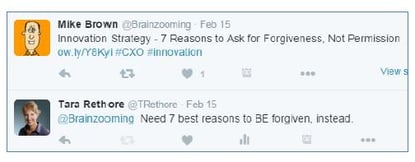 I haven’t watched 10 minutes of Desperate Housewives in the years it has been on ABC. My lack of personal context with the show didn’t stop me though from reading a recap story about Desperate Housewives in Entertainment Weekly. The article, “Housewives Confidential,” provides behind the scenes reminiscences about the show from its actors and executives. These Entertainment Weekly stories always seem to include both new creativity and innovation lessons or provide real life backdrop to creativity and innovation lessons we’ve already covered here on the Brainzooming blog. Here are five beneficial lessons from the Desperate Housewives article:
I haven’t watched 10 minutes of Desperate Housewives in the years it has been on ABC. My lack of personal context with the show didn’t stop me though from reading a recap story about Desperate Housewives in Entertainment Weekly. The article, “Housewives Confidential,” provides behind the scenes reminiscences about the show from its actors and executives. These Entertainment Weekly stories always seem to include both new creativity and innovation lessons or provide real life backdrop to creativity and innovation lessons we’ve already covered here on the Brainzooming blog. Here are five beneficial lessons from the Desperate Housewives article:
1. When a brand is damaged, there’s a lot less risk in “swinging for the fences.”
Susan Lyne, who was the president of ABC Entertainment when Desperate Housewives was green lighted, recalls that ABC was the fourth place network then. As a result, the network was looking for innovative types of programs which, “if executed perfectly,” could be massive hits. It’s always fun, and potentially very rewarding, to swing for the creative fences.
2. Plan ahead so you can be ready to ignore the plan.
Desperate Housewives creator Marc Cherry, in discussing some less than popular storylines and characters in the show’s second season, explained the challenge as not having good ideas and no time to think of any good ideas. The second season taught him the importance of planning six months in the future. The start of year three was marked by significantly more story planning than previously. Yet, when one of the main stars became pregnant in real life, Cherry had to be flexible in dealing with unplanned events.
3. You need to run different variables through creative formulas to stay innovative.
By the fifth season of Desperate Housewives, the show’s storyline was shifted five years into the future to freshen up the show. As Cherry points out, he wanted to try a new angle to the story since he didn’t want the “formula to get tired.” When you are able to capture your creative pursuits in some type of formulaic approach, it allows you to be much more deliberate in how you manipulate vital creative variables without blowing up the formula that’s worked.
4. Creativity and tight resources are intermingled. Get over it.
In a move that wound up in court with a lawsuit for wrongful termination, Marc Cherry killed off actress Nicollette Sheridan’s character unexpectedly. In court testimony, Cherry explained that amid a tight production budget, part of his consideration for the death was the salary a major character commanded could be spread across three or four actors the following season. With more actors in the creative mix, the creative story possibilities increase. What a fantastic reminder to never think you can use tight resources as an excuse to not be creative and innovative.
5. Get off the ride with a little creative juice left.
The plan was for Desperate Housewives to run nine seasons, but Cherry elected to wrap up the program in its eighth season. Co-executive producer, Bob Daily, notes how often the phrase, “We’ve done that…,” had crept into writing discussions. With a sense that all the viable storylines had been explored, Cherry stepped in to end the show early. While it is tough, stopping early is a decision many creative people and programs ignore, much to their ultimate chagrin.
Have you been watching Desperate Housewives?
If you’re a Desperate Housewives fan, what creative elements are you going to miss from the show once it’s gone? – Mike Brown
Download the free Brainzooming eBook, “Taking the NO Out of InNOvation” to help you generate fantastic creative ideas for any other area of your life! For an organizational creativity boost, contact The Brainzooming Group to help your team be more successful by rapidly expanding strategic options and creating innovative plans to efficiently implement. Email us at info@brainzooming.com or call us at 816-509-5320 to learn how we can deliver these benefits for you.




